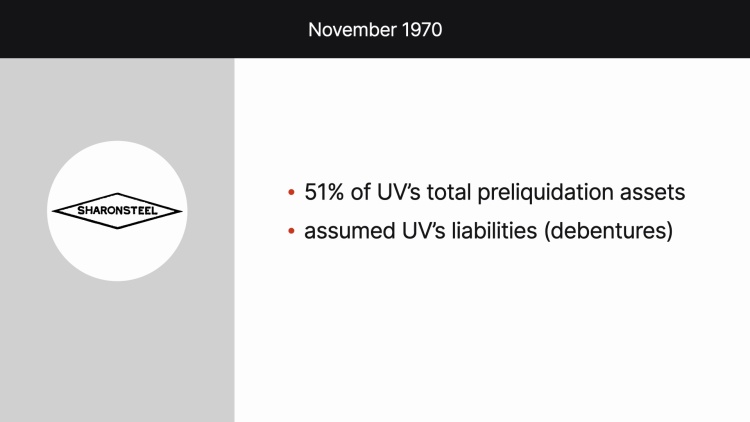Sharon Steel Corporation v. Chase Manhattan Bank, N.A.
United States Court of Appeals for the Second Circuit
691 F.2d 1039 (1982)

- Written by Sean Carroll, JD
Facts
Years ago, UV Industries (UV) issued debentures at low interest rates such that the market value of the debentures was less than their face value at the time the lawsuit in this case was initiated. UV had three subsidiaries and developed a plan to liquidate by selling all of its assets including the subsidiaries. On March 29, 1979, UV sold one of its subsidiaries for $345 million in cash (part of which was distributed to its stockholders). On October 2, 1979, UV sold the second subsidiary for $135 million cash. Finally, on November 26, 1979, UV sold the rest of its assets—a third subsidiary, some mining properties, and $322 million in cash, subject to the claim of the debenture holders in a face value amount of $123 million—to Sharon Steel Corporation (Sharon) (plaintiff). The assets in the sale to Sharon constituted approximately 51 percent of UV’s total assets at the start of the liquidation process. It was soon realized that neither UV nor Sharon could buy back the debentures because the debenture holders, knowing that the companies were in a position to buy, held out for higher than market prices even though the debentures were worth less than market value. The debentures contained boilerplate successor obligor clauses that provided that entities that acquired “all or substantially all” of UV’s assets could assume UV’s debt. Sharon believed that it qualified as a successor obligor and thus could assume UV’s debt because, Sharon argued, Sharon’s purchase constituted “all” of the assets that UV had left. On the other hand, the debenture holders (defendants), who wanted the debentures to become due and payable at market price upon the liquidation of UV, argued that the sale to Sharon did not constitute a sale of “all” of UV’s assets. The defendants maintained that UV’s earlier sales of its other subsidiaries were a part of its predetermined liquidation and thus Sharon’s purchase did not constitute a sale of “all” of UV’s assets for the purposes of determining UV’s successor obligor, if any. The trial court granted summary judgment to the defendants, holding that because UV liquidated, the debentures were due and payable to the debenture holders. Sharon appealed.
Rule of Law
Issue
Holding and Reasoning (Winter, J.)
What to do next…
Here's why 911,000 law students have relied on our case briefs:
- Written by law professors and practitioners, not other law students. 47,100 briefs, keyed to 997 casebooks. Top-notch customer support.
- The right amount of information, includes the facts, issues, rule of law, holding and reasoning, and any concurrences and dissents.
- Access in your classes, works on your mobile and tablet. Massive library of related video lessons and high quality multiple-choice questions.
- Easy to use, uniform format for every case brief. Written in plain English, not in legalese. Our briefs summarize and simplify; they don’t just repeat the court’s language.





